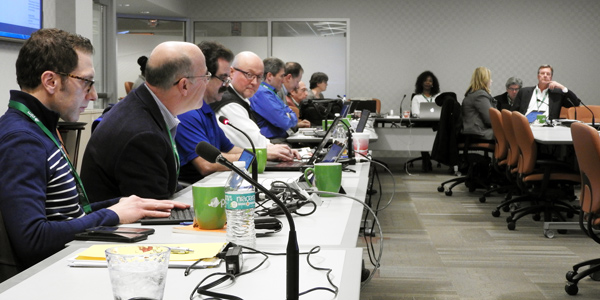By Rory D. Sweeney
VALLEY FORGE, Pa. — Seeing no hope to resolve a nearly two-year standoff on supplemental projects for replacing end-of-life transmission infrastructure, PJM stakeholders are seeking a new tack after voting last week to sunset the Transmission Replacement Process Senior Task Force (TRPSTF).
PJM’s Fran Barrett, task force administrator, provided a report on the group’s recent activity. Factions in the task force have been at odds, and RTO staff attempted to put it on hiatus at its most recent meeting. (See PJM Seeks to Suspend Task Force in ‘Unprecedented’ Move.)
Following the review, American Municipal Power’s Ed Tatum motioned to sunset the TRPSTF because “it doesn’t seem fruitful to continue on.” Old Dominion Electric Cooperative’s Adrien Ford seconded it, but Dominion Energy Marketing’s Jim Davis suggested that any action on disbanding the task force should wait until the D.C. Circuit Court of Appeals rules on ODEC’s request to overturn FERC’s policy of allocating all costs from Form 715 projects to the zone of the transmission owner whose criteria triggered the upgrades. (See FERC OKs Cost Allocation of PJM Transmission Projects.)
LS Power’s Sharon Segner called that case “potentially a gamechanger,” along with a CAISO complaint pending at FERC.
“Those two are the external factors that change the debate here. … My view is that [the TRPSTF] hasn’t been a particularly productive task force,” she said.
PJM and its TOs submitted compliance filings in March in response to a commission ruling that TOs weren’t properly complying with their obligations under Order 890 to provide stakeholders with adequate information on supplemental projects — transmission expansions or enhancements not required for compliance with reliability, operational performance or economic criteria.
Tatum said approval and implementation of the compliance filings will go on with or without the task force, so putting it on hiatus would remove any chance for all stakeholders to be involved in determining “the meat of what would actually be in those meetings” required by FERC’s order.
Barrett said the task force has been tasked with navigating “a strange intersection between the stakeholder process and a [FERC] directive that’s before the TOs and PJM,” but “we are at the end, and we were gearing up for a vote.”
He confirmed, following an inquiry from Tatum, that no one has voiced an opinion to him either way on whether to continue the task force. Tatum acknowledged it “has been the most unusual stakeholder process I’ve ever been involved in.”
GT Power Group’s Dave Pratzon called the task force “duplicative” and “not a great idea.” He endorsed sunsetting it in favor of developing a way to address the issues on a comprehensive scale.
“We appreciate it and that it has been moving at a good clip and it certainly has slowed down,” said Greg Poulos, executive director of the Consumer Advocates of the PJM States (CAPS). “Where it goes from here is a question, but it certainly has been useful.”
The motion was endorsed by stakeholders.
Tatum then offered a proposal that would define what information must be presented at each of the meetings required by FERC. AMP’s proposal would attempt to fully use each end-of-life project to address any reliability violations and seeks to define the dispute resolution process for challenging project proposals.
The proposal reflects many of AMP’s proposals in the task force but “softened” some of them so that it “erred on the side of what we think the TOs would say,” Tatum explained.
Pratzon called Tatum’s proposal “totally inappropriate” because it hadn’t been vetted through a lower committee. Several TO representatives agreed. However, load interests continue to be interested in addressing the concerns raised in the task force.
“The issues remain. I don’t feel like we’re to the finish line. Certainly, my members care deeply about these issues,” said Susan Bruce, representing the PJM Industrial Customer Coalition.
PJM staff questioned several of Tatum’s contentions that the proposal wouldn’t adversely impact the delicate timing of the Regional Transmission Expansion Plan process, among them that projects in dispute resolution would not hang in limbo. Tatum agreed to continuing to work with staff and acknowledged that staff do not agree with AMP’s belief that it would work without a hitch.




